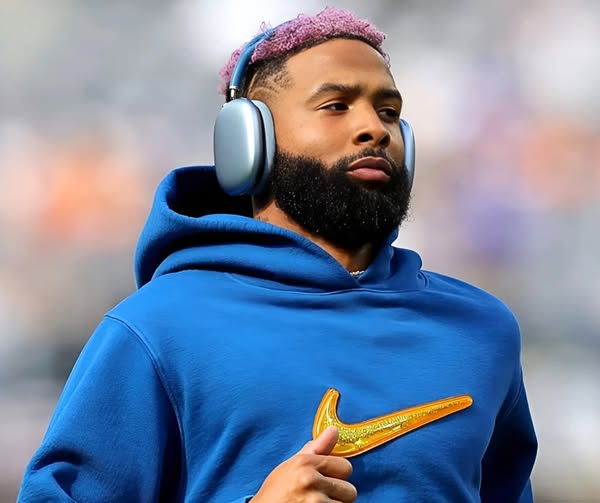If there’s one thing that will forever linger in the minds of LSU football fans, it’s the tragic story of Kyren Lacy.
In a program steeped in tradition, triumph, and unforgettable Saturday nights in Death Valley, few stories have struck a deeper emotional chord than that of Kyren Lacy. He wasn’t the highest-rated recruit LSU had ever landed. He didn’t win a Heisman Trophy or break SEC records. But for those who followed his journey, those who watched the way he carried himself on and off the field, and those who knew the personal battles he faced behind the bright lights and roaring crowds, Lacy’s name now carries the weight of heartbreak and admiration in equal measure.
Kyren Lacy’s path to LSU was far from ordinary. Raised in Thibodaux, Louisiana, a place rich with culture and community but often scarred by adversity, Lacy had to fight for everything he earned. He wasn’t born into privilege, but into a world where dreams like his were fragile and often fleeting. What separated Kyren from the rest wasn’t just talent—it was a relentless fire, a grit molded by hardship, and an unwavering belief that he was meant for something more.
He first made waves at the University of Louisiana at Lafayette, where his size, hands, and route-running stood out almost immediately. Coaches marveled at how coachable he was, how he soaked up every detail, and how he carried himself with humility. The stats didn’t always pop off the page, but the intangibles were impossible to ignore. It wasn’t long before Power Five programs came calling, and when LSU entered the conversation, Lacy saw a chance to not just elevate his game but to fulfill a dream that so many young Louisiana kids carry in their hearts.
Transferring to LSU was a monumental step. In Baton Rouge, expectations are a different beast entirely. You don’t just play for a university—you play for a state, for generations of fans who bleed purple and gold, and for a legacy that stretches back decades. But Kyren didn’t shrink under the weight of that responsibility. He embraced it. He wore the number two with pride, practiced like every rep was his last, and quickly earned the respect of teammates and coaches alike. He wasn’t the flashiest guy on the field, but when the game was on the line, Lacy was often the one making the crucial block, the clutch catch, or the tough yard after contact.
But what fans couldn’t always see was the storm he was fighting internally.
Mental health in sports has finally begun to receive the attention it deserves, but for many athletes—especially those in high-pressure environments like SEC football—there’s still a stigma. There’s still a fear that showing vulnerability might be mistaken for weakness. Kyren Lacy was one of those rare athletes who, even while navigating his own darkness, tried to be a source of light for others. He spoke openly to his teammates about the importance of checking in on one another, about staying grounded, and about the need to support each other beyond the white lines of the football field.
And yet, even those closest to him couldn’t fully grasp the depth of his pain.
What happened next sent shockwaves through the LSU community.
The official reports were clinical, devoid of the emotional complexity behind the tragedy. But for those who knew him—for those who had watched him lace up his cleats and represent LSU with every ounce of pride he had—it was devastating beyond words. The news of Kyren Lacy’s passing wasn’t just the loss of a player. It was the loss of a friend, a brother, a son, a teammate, and a beacon of strength who had silently carried the burden of his own struggles while trying to uplift everyone around him.
LSU football has endured losses before—on the field, in recruiting battles, in heartbreaking bowl games—but nothing could have prepared the program for this. Nothing could have prepared the fans, the coaching staff, or the players for the surreal, numbing realization that a young man who seemed to embody so much life and promise was suddenly gone.
In the days that followed, Death Valley became unusually quiet. Practices were subdued. Interviews were canceled. And social media, usually buzzing with the latest transfer portal news or game-week predictions, became a space for mourning and tribute. Former teammates, rivals, and even national media personalities paid their respects, sharing memories of Lacy’s kindness, his toughness, his infectious smile.
Head coach Brian Kelly, often measured and composed during press conferences, struggled to find the words. “Kyren was more than just a football player,” he said, voice cracking. “He was a part of our family. And losing him feels like we’ve lost a piece of our soul.”
For many LSU fans, this wasn’t just another story in the college football cycle. This was different. This was personal. Maybe it was because Kyren represented so many things that Louisianans hold dear: perseverance, loyalty, humility. Maybe it was because he was one of their own, a local kid who had made it to the biggest stage in the state. Or maybe it was because, in him, they saw a reflection of struggles that are all too common yet rarely discussed.
The season carried on, as it always does in sports. Games were played



